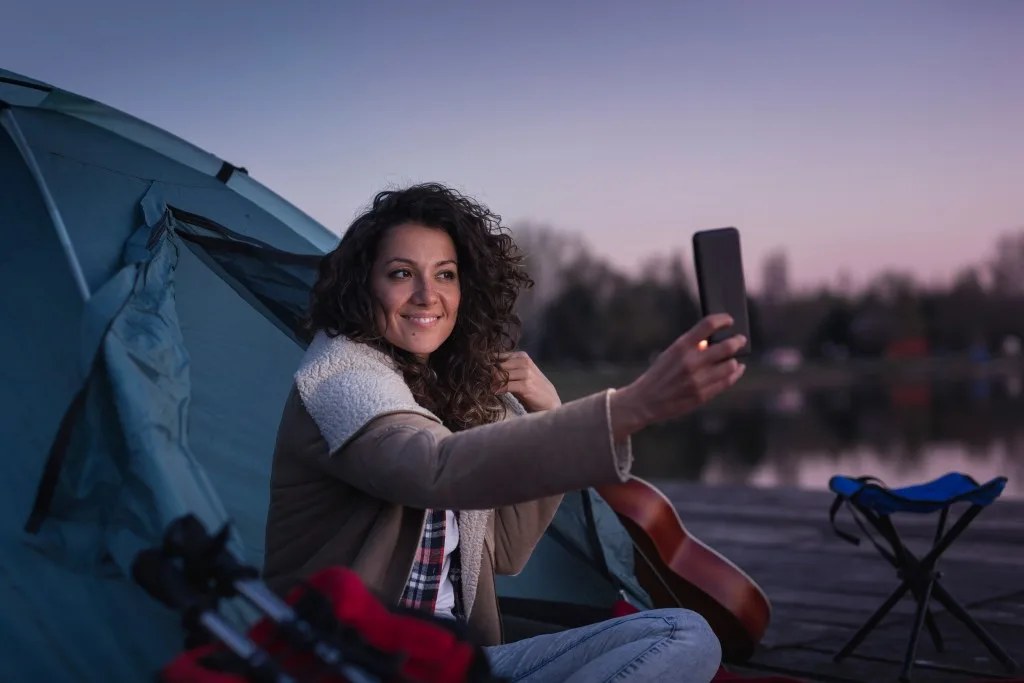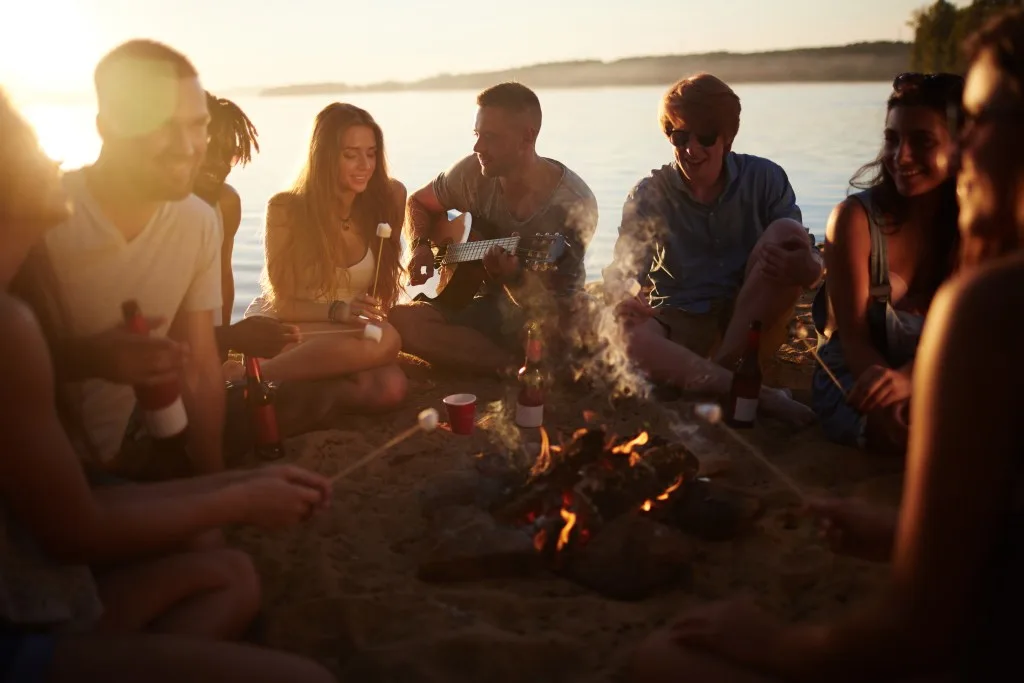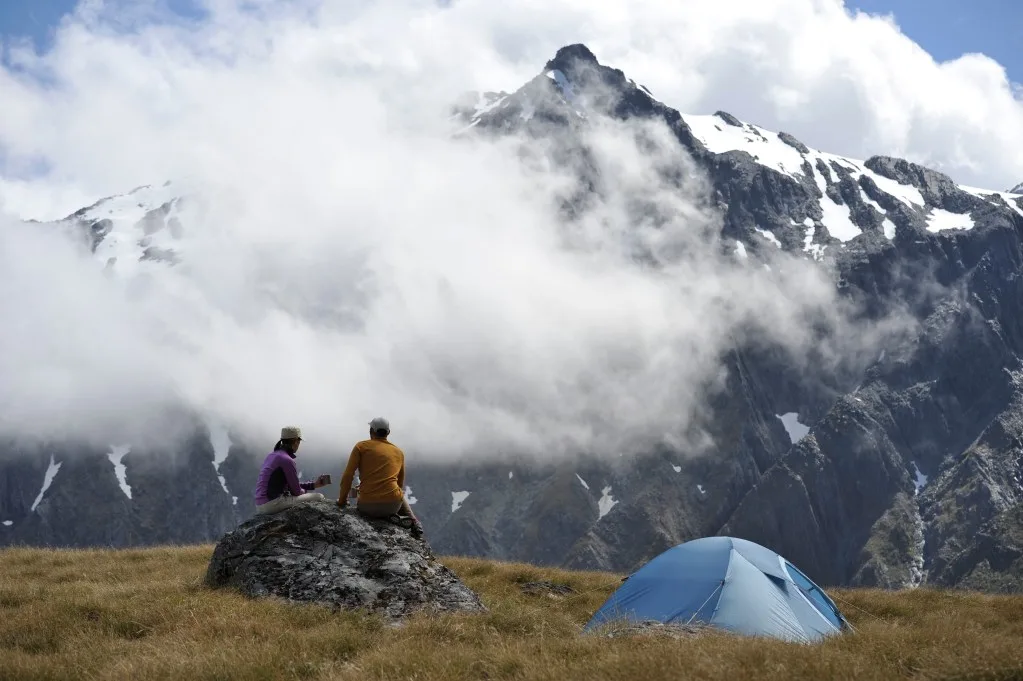Imagine you’ve just settled in for a movie night with the kids in your RV. Suddenly, your neighbor starts blaring rock music. And bright lights stream through the edges of your window shades. This is not how you planned your Saturday evening.
You were looking forward to spending peaceful family time together before the new school year begins.
Have you ever shared an experience like this? Maybe not exactly but a moment when you wondered if people were thinking of anyone else but themselves? Other people can ruin a camping experience. Let’s not be that guy for someone else.
Let’s look at some unwritten rules to camping that are just common courtesy so that everyone has an enjoyable stay.
What Is Camping Etiquette?
Camping has unwritten rules you need to follow to maintain good graces with campground staff and your neighbors. It doesn’t matter if you go for a weekend or longer; knowing acceptable and unacceptable behaviors can make or break your camping experience. It also affects the experience of others.
You won’t find these rules written down in a book or handed to you on a welcome sheet. They’re mostly common courtesy rules of etiquette so that everyone enjoys camping.
Even if you boondock most of the time, many unwritten rules still apply. You might not have to worry about offending neighbors at the time, but others who come after you won’t appreciate a dirty site. Do your part to ensure they have an enjoyable stay as well.
Why Does Camping Etiquette Matter?
You might think that as long as you observe the campground rules and follow the Leave No Trace principles at state and national parks, that’s all you need. You can protect the environment and provide positive experiences for others.
Perhaps you turn off the music at 10 p.m., pick up after your pet, or not wash your RV. But there’s more to camping etiquette than just obeying a short list of rules.
You also have common courtesy behaviors that you won’t find posted on any signs. By observing these unwritten rules, you can create a safe, enjoyable atmosphere for everyone else to camp — now and long-term. Consider how your actions will also affect others and the environment.
Pro Tip: Are you gonna give RV camping a try? Make sure you know The Don’ts of RV Park Camping.

10 Unwritten Camping Rules
Here are ten unwritten camping rules you and other travelers should obey. We could add many more common courtesy ideas, but hopefully, you’ll learn more as you read what is and isn’t appropriate.
1. Don’t Cut Through Other Sites
Cutting through campsites is one of the pet peeves of many RVers. Sitting by the front window of their RV eating dinner, they see a couple walk their dog right through their campsite to take a shortcut to the dog park.
Or maybe you want to read a book outside under the awning and two kids race through to take a shortcut to the playground. It is not okay to cut through other sites. It’s rude. Don’t do it.
2. Don’t Leave Your Outside Lights on All Night
If you plan to get back late from a long hike or evening dinner out, you probably turn on your awning lights or porch lights so you can see when you arrive in the dark. Maybe you have string lights along your outdoor space or a rope light outlying the patio mat. This is a safety measure. It’s fine to do this.
But once you return, please turn off all of your outside lights. Your neighbor may have a bedroom window that peers into your campsite. And if the glowing light shines through that window all night long, you may have an unhappy camper in the morning. Be considerate of your neighbors.
3. Don’t Try to Talk to People While They’re Setting up or Packing Up
You might want to make friends with people, but when a family backs into a site and starts setting up, let them focus and go through their routine. You can say hello later. Setting up and packing up require travelers to do things in a certain order. Or else they may forget tasks or make mistakes.
Don’t interrupt someone connecting their sewer hose to welcome him to the campground. If you distract them from their task, they may end up with sewage waste all over the campsite the next day. Wait until folks are relaxing in their chairs before you head over to strike up a conversation.

4. Don’t Arrive in the Dark
Sometimes things happen. A tire blows out, traffic gets backed up for hours, or you didn’t leave when you wanted to. But if possible, avoid arriving at your destination in the dark. In particular, avoid setting up once other campers have gone to bed.
It makes it difficult for you to find your way around a campground and set up in an unknown location in the dark. Additionally, it’s also inconsiderate of others who might have already turned in for the night.
Consider a young family with children where the parents spent an hour getting their kids to fall asleep. When you come through squeaking and making noises unhitching or pushing out slides, they’ll hold their breath that their kids don’t wake up. Or consider someone who has to get up early for a long drive the next day. When you arrive late, it doesn’t just affect you.
5. Research the Campground
When you book a campground, make sure to read the rules first. Understand its late check-in policy. Some locations won’t allow check-ins after a certain time. Know pet rules like keeping your dog on a leash or having no more than two pets at a campsite.
If you arrive with four dogs and a cat, don’t blame the staff when they tell you to leave. You are not the exception to the rules. Don’t show up with a sense of entitlement and ruin the day for other people.
6. Leave No Trace
You might have seen this principle printed on signs at state or national parks. However, Leave No Trace applies everywhere, not just in protected areas. If you make a mess, clean it up. Don’t leave a trashy site for the next RVer who comes in.
It’s already stressful enough to have a long drive day and then get set up. Don’t make them have to pick up dog poop or nasty paper towels littered all over the campsite, too.
But this principle isn’t just about keeping places clean for others. It’s also about protecting the environment. Don’t take rocks or other things from campgrounds. If boondocking, leave the area the same as when you found it. Our planet relies on us to take care of it. Do your part.

7. Put Out Campfires Before Going to Bed
There’s nothing better than sitting by a campfire at night with friends. Enjoying cold beverages, telling corny jokes, or sharing memories of your travels, makes a perfect ending to a camping day. But when the night ends and everyone heads inside, please put out the fire. Don’t be lazy. Your actions could result in terrible consequences. Don’t be the guy who makes the nightly news by causing a forest fire.
8. Observe Quiet Hours
This rule you will find written on many campground information sheets. The quiet hours don’t just apply to rowdy teenagers. They’re for everyone. Like researching the campground, don’t enter a campsite feeling like the rules don’t apply to you.
If you shouldn’t have music playing outside after 10 p.m., then don’t have music playing outside after 10 p.m. Be considerate of your neighbors who have to get up and go to work the next day or who have young children — or literally anyone else, no matter their situation.
9. Don’t Wash Dishes in the Bathroom
You have to get creative sometimes when washing dishes at campgrounds that don’t offer full hookups. Sometimes you don’t want to fill up your tanks if you don’t readily have access to a dump station. You also want to conserve water if boondocking.
Whatever you do about your dishes, don’t wash them in the bathroom. Nobody wants to smell onions or garlic while they take a shower. And you don’t want to hog one of the only sinks. Find the on-site dishwashing station or get a bucket and wash dishes at your campsite.
10. Leave Extra Wood
You can welcome other campers without being physically present by leaving extra wood. Often you can’t transport wood from place to place, so you have no reason to take the wood with you.
If you bought a bundle from the campground store, leave the extra pieces for the next person to enjoy.

Can I Bring My Own Campfire Wood?
You can’t move firewood from campground to campground. It might be fine if you simply move a few sites down, but it’s certainly not okay if you cross state lines. Bugs live in wood.
If you bring new bugs into an area, this invasive species may wreak havoc on the habitats of native animals. This is not allowed. Leave your firewood at the campsite for the next person.
Pro Tip: Give these 11 Types of Camping a try on your next adventure.
Be A Good Neighbor While Enjoying the Weekend
You might think camping is about connecting with nature and creating a space for you to escape your nine-to-five job. That might be true, but it’s not just about you. Be a good neighbor, whether you have actual neighbors or not.
Be considerate of the next RVer who comes into that campsite. And be considerate of the other people who try to connect with nature and enjoy an escape from their work.
Everyone wants to have a good time. Don’t do so at the expense of others. Are there any additional unwritten rules you would add to this list? Tell us your thoughts in the comments!
Discover the Best Free Camping Across the USA
To be honest with you, we hate paying for camping. There are so many free campsites in America (with complete privacy).
You should give it a try!
As a matter of fact, these free campsites are yours. Every time you pay federal taxes, you’re contributing to these lands.
Become a FREE CAMPING INSIDER and join the 100,000 campers that love to score the best site!
We’ll send you the 50 Best Free Campsites in the USA (one per state). Access the list by submitting your email below: